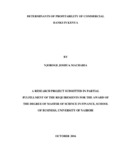| dc.description.abstract | Commercial banks are important to the financial segment, particularly in developing economies where capital markets are not well developed and strong. Commercial Banks’ profitability is important because the soundness of an industry is closely connected to soundness of the whole economy. Profitability of the banking sector is also central as the well-being of the industry is closely associated with the wellness of the whole economy in general. Thus, a proficient and productive banking sector is able and better placed to endure negative economic shocks. This study investigated determinants of profitability of Kenyan commercial banks. The study explored effect of the bank size, adequacy of capital, liquidity, credit risk and operational efficiency on banks’ profitability. The study adopted a descriptive design helped to establish the factors, which influence the Kenya’s commercial banks profitability. The study used secondary data from 43 registered commercial banks as at 31/12/2015 from the years 2011 to 2015. The data collected was edited, sorted for completeness and then analyzed using ordinary least squares (OLS) and Pearson correlation using the statistical package for social studies and established a negative insignificant relation between bank size, operational efficiency and profitability and a significant negative relation between capital adequacy, credit risk and banks’ profitability. The study concluded that capital plays a key role in determining commercial banks profitability and higher levels of capital adequacy increases profitability of commercial banks. The study also concluded that an increase in nonperforming loans increase credit risk which adversely affects profitability. The study finally concluded that high levels of liquidity provides adequate funds to lend which in turn increase interest income hence banks’ profitability and that poor operational efficiency through poor management of expenses reduces the profitability of commercial banks. The study recommended that managers of banks to develop effected policies to to ensure they to reduce the level of nonperforming loans and that banks should effectively manage their operational expenses and costs to ensure that their banks are efficient and to maximize profits. The study also recommended that regulatory authorities like the central bank of Kenya should develop effective policies on capital adequacy, liquidity and credit risk management to ensure that banks are in a position where they can enhance their profitability | en_US |



